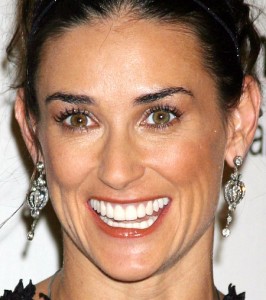Demi Moore’s 911 call
“Send an ambulance right now. This is an emergency.” So begins the dramatic 911 call, in which Demi Moore’s friends are desperately trying to get an ambulance to the actress’ Beverly Hills home as quickly as possible, which was released this morning by the Los Angeles Fire Department. On the heavily redacted recording, which lasts about 10 minutes, one of Moore’s friends begins arguing with the dispatcher amid confusion over which agency covers the neighborhood and should be sending paramedics.
“Why is there not an ambulance coming now?” the woman says testily before explaining what caused the star to “act crazy.”
“She smoked something. It’s not marijuana but it’s similar to incense. She seems to be having convulsions of some sort.
“She’s semi-conscious … barely. She’s convulsing.”
The phone is passed to another woman, who tells the dispatcher: “She’s not breathing normally … she’s burning up.”
Asked if she knows exactly what Moore smoked or any other drugs she might have consumed, the second woman replies – “She’s been having some issues with some other stuff lately. I don’t know what she’s been taking or not.”
The dispatcher calms the woman down and explains how to treat Moore, stressing to keep her airway open.
By the end of the call, the paramedics have arrived to take Moore to Sherman Oaks Hospital, where she has since been discharged.
As E! News has previously reported, the 49-year-old Moore had been hosting a birthday party for a friend at the time and had exhibited “pretty hyper” behavior in the moments before the 911 call.
When the dramatic recording of the 911 call leading to Demi Moore’s Monday night hospitalization was released to the public today, it begged the question – Does Moore have the legal right to have that call kept private?
Not according to officials. “911 calls are public information” – says Tina Haro, the public information officer for the Los Angeles Fire Department’s Community Liaison Office, which reviewed the tape for release alongside the Los Angeles County District Attorney’s Office.
Though the LAFD was legally required to redact personal and medical information about Moore (her history, treatment Monday, phone number, gate code), when the media made a request for that public information, LAFD was legally required to release it. “Everything we [released] is public record, so we have to give it to [journalists] according to the California Public Records Act” – Haro says.
The only exception, Haro says, would be if there were a pending criminal trial or legal issue. Then the courts (as opposed to Moore’s lawyers) could embargo the release. (As of press time, Haro was unaware of any attempt by Moore’s legal team to halt or follow up on the tape’s release, and Moore’s reps would not specifically comment on the 911 call or its release today.)
Still, legality aside, the other question being asked in the wake of Moore’s call going public is whether it’s morally sound to share a recording of a 911 emergency phone call on the Web for millions to see and hear.
Los Angeles area privacy attorney Jeffrey S. Kravitz says that Moore’s celebrity status means she “is a public figure, so she has very limited protection.”
But Tony Stuart, the LA attorney who argued for privacy rights in the landmark Shulman v. Group W Productions, believes Moore should have a right to privacy because of the nature that 911 call. “It seems to me that a call for medical assistance ought to just be private, period” – he says.
Stuart also acknowledges the possible snowball effect of releasing a 911 call – “How can a person feel free to give important info over the telephone to a 911 dispatch if they’re worried that something they say might be broadcast to the public?” Agreed Kravitz: “You could make a good argument that it is in the public’s interest not to reveal these [tapes], because, otherwise, people would not call [911], to their detriment.”
Moore announced in November she had decided to end her marriage to Ashton Kutcher following news of alleged infidelity.
Moore (49) and Kutcher (33) were wed in September 2005.
Kutcher became a stepfather to Moore’s three daughters – Rumer, Scout and Tallulah Belle – from her 13-year marriage to actor Bruce Willis. Moore and Willis divorced in 2000 but remained friendly. Moore and Kutcher were photographed socializing with Willis, and the couple attended Willis’ wedding to model-actress Emma Heming in 2009.
Moore and Kutcher created the DNA Foundation, also known as the Demi and Ashton Foundation, in 2010 to combat the organized sexual exploitation of girls around the globe. They later lent their support to the United Nations’ efforts to fight human trafficking, a scourge the international organization estimates affects about 2,5 million people worldwide.
Moore can be seen on screen in the recent films “Margin Call” and “Another Happy Day.” Kutcher replaced Charlie Sheen on TV’s “Two and a Half Men” as is part of the ensemble film “New Year’s Eve.”
